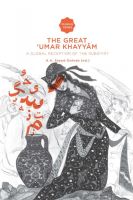American-Germans and Edward Fitzgerald’s Rubaiyat of Omar Khayyam. Sol Gittleman.
American-German Review 29 (1962) nr. 1, p. 23-24.
Archives
Edward FitzGerald’s “Rubaiyat of Omar Khayyam” in Germany
Edward FitzGerald’s “Rubaiyat of Omar Khayyam” in Germany. Sol Gittleman.
Notes and Queries (1962), nr. 9, p. 95-96.
List of German translations, but without the versions by Schack, Bodenstedt and Rosen.
The Fame of Omar Khayyam
The Fame of Omar Khayyam. Abd al-Haqq Fádil.
The Muslim World, 50 (1960) 4, pp. 259-268
Omar Khayyam’s popularity has two phases. In his life he was tremendously famous for his copious learning; after his death he became celebrated for his brilliant Rubáiyyát. In both he was unique and matchless. But he did not enjoy his fame completely either in life or in death. It is time now for us to grant him his due in full as a man of learning and as a poet.
A wanderer’s note-book : “Young Parker”
A wanderer’s note-book : “Young Parker”. E.V. Lucas
In: The Sunday Times, January 16, 1938.
E.V. Lucas wonders why none of the employees at Parker’s recognized the qualities of the verses that Fitzgerald sent them to be published in Fraser’s Magazine
The reception of Edward Fitzgerald’s Rubaiyat of Omar Khayyam in England and Germany
The reception of Edward Fitzgerald’s Rubaiyat of Omar Khayyam in England and Germany. Sol Gittleman. University of Michigan, 1961. iii, 259 p.
The Great ‘Umar Khayyám. A Global Reception of the Rubáiyát
The Great ‘Umar Khayyám. A Global Reception of the Rubáiyát. A.A. Seyed-Gohrab. Leiden, Leiden University Press, 2012. 267 p. (Iranian Studies Series). ISBN: 9789087281571.
Omar Khayyam’s Transgressive Ethics and Their Socio-Political Implications in Contemporary Iran
Omar Khayyam’s Transgressive Ethics and Their Socio-Political Implications in Contemporary Iran. A.A. Seyed-Gohrab.
In: Iran Namag, Vol. 5, no. 3 (Fall 2020).
Summary:
In this paper, the author examines several social implications of Khayyam’s poetry and the reception history of the Persian sage (hakim) Omar Khayyam, who has become a personification of transgressive ideas in Persian literary history. The fascination of the author is due not only to Khayyam’s poetic genius (although he is not the author of the majority of quatrains attributed to him), but also to his problematic reception in twentieth-century Iran and how he has been connected to the notion of modernity. Both religious and secular intellectuals have tried to position Khayyam in the modern intellectual history of Iran in their own ways.
